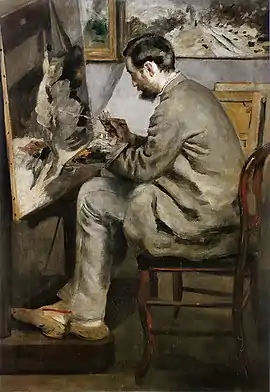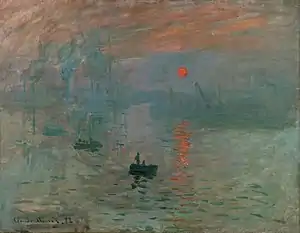Frédéric Bazille | |
|---|---|
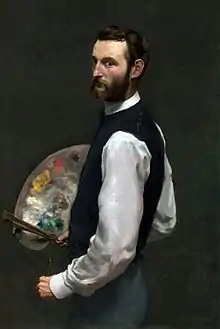 Frédéric Bazille, Self-portrait, 1865–1866, oil on canvas, Art Institute of Chicago | |
| Born | Jean Frédéric Bazille 6 December 1841 |
| Died | 28 November 1870 (aged 28) Beaune-la-Rolande, France |
| Known for | Painting |
| Movement | Impressionism |
| Signature | |
 | |
Jean Frédéric Bazille (December 6, 1841 – November 28, 1870) was a French Impressionist painter. Many of Bazille's major works are examples of figure painting in which he placed the subject figure within a landscape painted en plein air.[1]
Life and work

Frédéric Bazille was born in Montpellier, Hérault, Languedoc-Roussillon, France, into a wealthy wine merchant Protestant family. Bazille grew up in the Le Domaine de Méric, a wine-producing estate in Castelnau-le-Lez, near Montpellier, owned by his family.[3] He became interested in painting after seeing some works of Eugène Delacroix. His family agreed to let him study painting, but only if he also studied medicine.[1]
Bazille began studying medicine in 1859, and moved to Paris in 1862 to continue his studies. There he met Pierre-Auguste Renoir and Alfred Sisley, was drawn to Impressionist painting, and began taking classes in Charles Gleyre's studio. After failing his medical exam in 1864, he began painting full-time. His close friends included Claude Monet, Alfred Sisley and Édouard Manet. Bazille was generous with his wealth and helped support his less fortunate associates by giving them space in his studio and materials to use.[1]
Bazille was just twenty-three years old when he painted several of his best-known works, including The Pink Dress (c. 1864, Musée d'Orsay, Paris). This painting combines a portrait-like depiction of Bazille's cousin, Thérèse des Hours, who is seen from behind—and the sunlit landscape at which she gazes.[4] His best-known painting is Family Reunion, painted 1867–1868 (Musée d'Orsay, Paris).
Frédéric Bazille joined a Zouave regiment in August 1870, a month after the outbreak of the Franco-Prussian War. On November 28 of that year, he was with his unit at the Battle of Beaune-la-Rolande when, his officer having been injured, he took command and led an assault on the German position. He was hit twice in the failed attack and died on the battlefield at the age of twenty-eight. His father travelled to the battlefield a few days later to take his body back for burial at Montpellier in the Protestant cemetery over a week later.[5][6]
Main works
- La robe rose, (1864) – 147 x 110 cm, Musée d'Orsay, Paris
- Studio on Rue Furstenberg, (1865) – 80 x 65 cm, Musée Fabre, Montpellier
- Aigues-Mortes, (1867) – 46 x 55 cm, Musée Fabre, Montpellier
- Self-portrait, (1865) – 109 x72 cm, Art Institute of Chicago
- Family Reunion, (1867) – 152 x 230 cm, Musée d'Orsay, Paris
- Le Pécheur à l'épervier, (1868) – 134 x 83 cm, Fondation Rau pour le tiers-monde, Zürich
- View of the Village, (1868) – 130 x 89 cm, Musée Fabre, Montpellier
- Scène d'été, (1869) – 158 x 158 cm, Cambridge, Harvard University
- La Toilette, (1870) – 132 x 127 cm., Musée Fabre, Montpellier
- L'Atelier de la rue Condamine, (1870) – 98 x 128.5 cm, Musée d'Orsay, Paris
- Paysage au bord du Lez, (1870) – 137.8 x 202.5 cm, The Minneapolis Institute of Arts, Minneapolis
Gallery
 Self Portrait, unknown date
Self Portrait, unknown date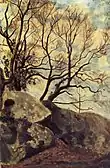 Study of Trees, 1863
Study of Trees, 1863 Reclining Nude, 1864
Reclining Nude, 1864 The Pink Dress (View of Castelnau-le-Lez, Hérault), 1864, oil on canvas, Musée d'Orsay
The Pink Dress (View of Castelnau-le-Lez, Hérault), 1864, oil on canvas, Musée d'Orsay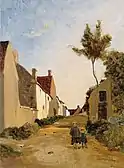 Chailly, 1865, Musée Fabre, Montpellier
Chailly, 1865, Musée Fabre, Montpellier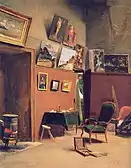 Studio on Rue Furstenberg, 1865, Musée Fabre, Montpellier
Studio on Rue Furstenberg, 1865, Musée Fabre, Montpellier Little Italian Street Singer, 1866
Little Italian Street Singer, 1866 Le Petit Jardinier (The Little Gardener), c. 1866–67, oil on canvas Museum of Fine Arts, Houston
Le Petit Jardinier (The Little Gardener), c. 1866–67, oil on canvas Museum of Fine Arts, Houston Nature morte avec du poisson, Still life with fish, c. 1866–67
Nature morte avec du poisson, Still life with fish, c. 1866–67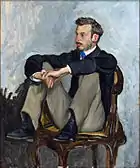 Portrait of Renoir, 1867, oil on canvas, Musée d'Orsay
Portrait of Renoir, 1867, oil on canvas, Musée d'Orsay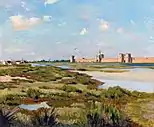 Aigues-Mortes, 1867
Aigues-Mortes, 1867 The Family Reunion, c. 1867, Musée d'Orsay
The Family Reunion, c. 1867, Musée d'Orsay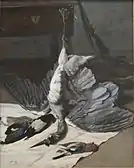 Nature morte au héron, 1867
Nature morte au héron, 1867_1868.jpg.webp) Etude pour une vendange, 1868
Etude pour une vendange, 1868 View of the Village, 1868, Musée Fabre, Montpellier
View of the Village, 1868, Musée Fabre, Montpellier Fisherman with a Net, 1868
Fisherman with a Net, 1868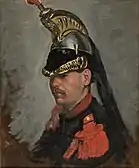 Portrait of Alphonse Tissie, 1868, Musée Fabre, Montpellier
Portrait of Alphonse Tissie, 1868, Musée Fabre, Montpellier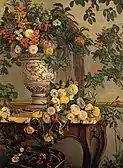 Flowers, 1868
Flowers, 1868 Portrait of Paul Verlaine, 1868, Dallas Museum of Art
Portrait of Paul Verlaine, 1868, Dallas Museum of Art
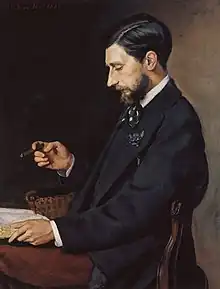 Portrait of Edmond Maître, 1869
Portrait of Edmond Maître, 1869 La Toilette, 1870, Musée Fabre
La Toilette, 1870, Musée Fabre
 Paysage au bord du Lez, 1870, oil on canvas, Minneapolis Institute of Arts
Paysage au bord du Lez, 1870, oil on canvas, Minneapolis Institute of Arts
See also
Notes
- 1 2 3 "Frédéric Bazille: A Tragic Story". WetCanvas. Archived from the original on July 26, 2010. Retrieved June 20, 2011.
- ↑ The Art Book. Phaidon Press. 1994. p. 33. ISBN 91-0-056859-7.
- ↑ "Domaine de Méric - Ville de Montpellier". montpellier.fr. January 8, 2015. Retrieved 2022-07-11.
- ↑ Rosenblum, 1989, p. 225
- ↑ Gotlieb, Marc (2016). The Deaths of Henri Regnault. University of Chicago Press. p. 185. ISBN 978-0-226-27604-5.
- ↑ "Frédéric Bazille and the Birth of Impressionism". www.nga.gov. Retrieved 2018-10-19.
References
External links
- Frédéric Bazille at the National Gallery of Art
- Bazille Gallery at MuseumSyndicate Archived 2010-09-13 at the Wayback Machine
- Impressionism: a centenary exhibition, an exhibition catalog from The Metropolitan Museum of Art (PDF available online), which contains material on Bazille (p. 37–39)
